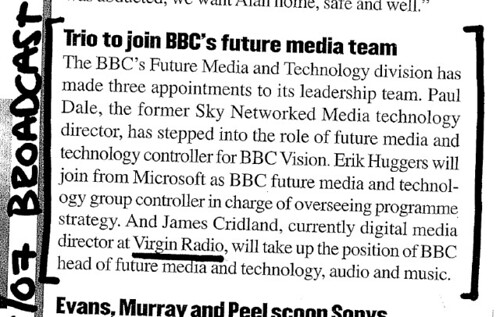Hmmm…. It’s not just Digg that’s been having trouble with restive users. It seems that Second Life is also having difficulties. Tech Review reports that:
The overseers of Second Life, a complex and booming virtual world hailed by many as the first step toward an immersive 3-D Internet, attempted yesterday to calm angry cyber-citizens who have petitioned for fixes to technical bugs recently plaguing the world.
The main problem, in members’ eyes: Second Life is growing so fast that it’s straining Linden Lab’s resources to the limit, including its developers’ ability to fix old bugs and roll out new software versions that don’t introduce new problems. In a town-hall meeting yesterday inside Second Life, the company appealed for patience.
“We are working to fix bugs and enable incremental improvement,” said Cory Ondrejka, chief technology officer at Linden Lab, the venture-funded San Francisco startup that launched Second Life in 2003. The town-hall meeting was hastily arranged in response to a damning open letter published by irritated Second Life residents on April 30. “At the same time, we are building the foundations for the next-gen architecture that will radically improve our ability to scale,” Ondrejka said.
Every day, some 25,000 computer owners, plus teams from dozens of major corporations, are rushing to join Second Life. But as these new members buy virtual land, set up house for their avatars, and start in-world businesses, the strain on the Second Life “grid” is increasing. Linden Lab is adding more than 120 new servers every week, according to Ondrejka, but users say that the company still isn’t keeping up. Complaints have piled up in Second Life forums and blogs from longtime users impatient over frequent slowdowns and crashes, property that goes missing, messages that aren’t delivered, search and friend-finder functions that don’t work, purchases that aren’t completed, and poor to nonexistent customer service and technical support.
The dissatisfaction culminated this week in the open letter, which demands that Linden Lab address the bugs “immediately,” before rolling out planned features such as voice chat. More than 3,000 Second Life users have signed the letter so far.
“People feel that Linden Lab is failing them because they are paying a great deal, in some cases, for a product that is failing to work acceptably, from a company that will no longer communicate with its customers,” says one signer, a United Kingdom-based IT manager known within Second Life as Inigo Chamerberlin…






